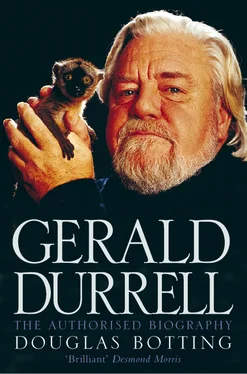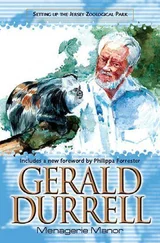They bowled along the edge of the sea, then sped up a hill. Suddenly Spiro jammed his foot on the brake and the car juddered to a halt in a thick cloud of dust.
‘Theres you ares,’ he said, jabbing with a stubby finger; ‘that’s the villa with the bathrooms, likes you wanted.’
They saw a small, square, single-storeyed, strawberry-pink villa, situated only a stroll away from Larry and Nancy’s place. It stood in its own minuscule garden, guarded by a group of slim, gently swaying cypresses, with a sea of olive trees filling the valley and lapping up the hill all around. The tiny balcony at the front was overgrown with a rampant bougainvillaea and the shutters had been faded by the sun to a delicate, cracked green. They loved the place, instantly and totally. ‘The warm air was thick with the scent of a hundred dying flowers,’ Gerald recalled, ‘full of the gentle, soothing whisper and murmur of insects. As soon as we saw it, we wanted to live there – it was as though the villa had been standing there waiting for our arrival. We felt we had come home.’
Moving day came, and the family’s baggage was carted up the hill, the shutters opened, floors swept, linen aired, beds made, charcoal fire lit in the kitchen, pots and pans arrayed, a home slowly formed amid much babble and commotion. To keep out of the way Gerald absconded to the garden, a strange garden with tiny flowerbeds laid out in complicated geometrical patterns of stars, half-moons, triangles and circles. That garden was a revelation – ‘a magic land,’ he remembered, ‘through which roamed creatures I had never seen before.’ Never had he seen such fecundity in nature. Under every stone he found twenty different creatures, on every plant stem twenty more: ladybirds, carpenter bees, hummingbird hawk-moths, giant ants, lacewing-flies that laid eggs on stilts, crab-spiders that changed colour like chameleons. Bewildered by the profusion of life on his doorstep, he wandered round the garden in a daze, then spent hours squatting on his heels watching the private lives of the creatures around him. ‘It wasn’t until we moved into that first villa,’ Gerald was to tell a friend years later, ‘that suddenly we realised we had been transported into paradise … For me it was like being pushed off the Bournemouth cliffs into heaven. From then onwards, just like that, I was home.’
So the family settled in, with the thunderous Spiro attending to their every need. It was Spiro who took them shopping down in the town, bargaining fiercely over the smallest purchase. It was Spiro who chivvied and harassed the bank manager about Mother’s missing funds and hectored the customs officials over confiscated baggage. It was Spiro who, ‘bull-voiced and scowling’, advised them on everything they needed to know about day-to-day life on the island and tended to their smallest whim. Mother he adored, hovering over her like a guardian angel, and he was horrified one day when Leslie told him: ‘She’s really not much good as a mother, you know.’ Spiro leapt instantly to her defence. ‘Donts says that!’ he roared. ‘Honest to Gods, if I hads a mother like yours I’d gos down every mornings and kisses her feets.’
Each member of the Durrell family adapted to their new environment according to their temperament and needs. Margo’s adaptation was the quickest. Short, blonde and attractive, by simply donning a revolutionary two-piece swimsuit and sunbathing in the olive groves she soon attracted an admiring band of peasant youths who appeared ‘like magic’ out of an apparently empty countryside. Or so Gerald was to claim in the best-selling account of Corfu he wrote twenty years later, My Family and Other Animals , a book which gives much of the essence of the Durrells’ years on Corfu, though only the barest outline of the chronology. Margo saw herself differently. ‘Gerald thought of me as a totally idiotic girl who was only interested in boys,’ she complained years later. ‘Gerry never saw the real me, the depth of character I consider I have. Looking back, I see myself as having been a romantic, sensitive person who wanted to understand the spirit of the Greeks. I’m the one who got to grips with the reality of Corfu.’
Leslie’s acclimatisation was the noisiest. The moment he arrived he unpacked his guns, cleaned, oiled and loaded them, then blazed away at an old tin-can from his bedroom window. Mother meanwhile pottered about all day in the kitchen, tending the bubbling pots on the charcoal fires amid an aroma of garlic and herbs. ‘Mother Durrell and I had a lot of fun cooking,’ Nancy recalled. ‘She was very keen on making tremendously hot things that nobody else could really eat. We made all kinds of lime chutneys, and tomato jam and marrow jam, and we ate loquats in the season, and lots of prickly pears.’
As for Lawrence, he was, Gerald recorded later, ‘designed by Providence to go through life like a small, blond firework, exploding ideas in other people’s minds, and then curling up with cat-like unctuousness and refusing to take any blame for the consequences’. Though My Family and Other Animals gives the impression that Lawrence shared the same house as the rest of the family, in fact he and Nancy lived under a separate roof for most of their time on Corfu. Equally, though Lawrence liked to declare publicly that he never saw the family on the island except at Christmas, in fact he and Nancy saw them a great deal. This was easy in the first months, when they were near neighbours at Perama, but relatively more difficult when they moved to the north of the island later. Nancy was to recall her association with the family all too clearly.
Larry used to needle Leslie mercilessly , telling him what a fool he was, how he’d wrecked his life, slapping him down all the time. Leslie had three or four different sorts of guns and when he got angry with Larry he used to point one at him and threaten to shoot him. I really thought he possibly would, and sometimes he used to take my side – used to rush in and point his gun at Larry when Larry and I were quarrelling. Poor old Leslie, he just marched across the fields with the field police, a very low category of person, with rifles over their shoulders. He had a pierced eardrum, so he didn’t enjoy all the swimming and things we did. It wasn’t much of an existence for a nineteen-year-old boy.
The villa only had three bedrooms, so though Gerald no longer passed his nights curled up in the same bed as his mother, he still had to share a room with her, squeezing into a cot in the corner. To Lawrence fell the role of father figure, then and for ever more. Lawrence was old enough to appear to the boy as someone from an earlier, more fatherly than brotherly generation, and he was all-knowing and authoritarian enough to fulfil the boy’s expectations of a father substitute.
Gradually the family came to grips with the fact that, Spiro apart, virtually nobody they ever encountered spoke to them in an intelligible tongue. Greek was not an easy language to learn, and the Durrells’ struggle to master it was long and dogged. For the younger members of the family it was a struggle slowly but surely won, less by a process of formal learning than a kind of osmosis, so that gradually they turned – linguistically speaking – into Corfiot peasant Greeks, retaining the language more or less intact till the end of their lives. ‘Gradually I came to understand them,’ Gerald remembered. ‘What had at first been a confused babble became a series of recognisable separate sounds. Then suddenly, they took on meaning, and slowly and haltingly I started to use them myself.’
Corfu was arguably the most beautiful of all the Mediterranean islands, and in the Durrells’ time it was virtually untouched by modern development. It was also one of the most sophisticated regions of Greece, and successive rulers of the island, including the Venetians, the French and the British, had all made contributions of one sort or another to how it looked and how its people lived. The Venetians had contributed an island aristocracy, much of Corfu town and many of the finest buildings, while the British, who had departed in 1864, had introduced ginger beer, a postal service and the game of cricket. It helped the Durrells hugely that the British were highly regarded by the islanders, who still believed that every Britisher they met was a lord and a paragon of all civilised virtues. Gerald was often greeted as ‘the little English lord’ by the local peasantry, and all doors were almost always open to him.
Читать дальше










